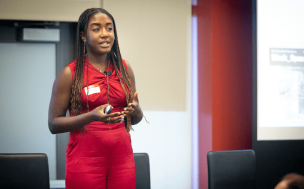But for women, the rewards may not be so rich. A separate GMAC study shows that women come to business school earning $10,000 less than men, on average.
The pay gap narrows on graduation but grows wider as students advance in a career. At entry-level jobs, US women’s earnings are the closest in parity to men’s, at 85%, according to GMAC. But the gap in their cumulative annual base salary widens to about $400,000 over 20 years from graduation.
In Europe, the women’s advocacy group Catalyst found the pay gap between women and men MBA graduates, in their first job, is €4,255 ($4,900). After five years it widened to €36,304 ($42,000). The research does not take into account the difference in pay between functions and industries.
The figures suggest, startlingly, that an MBA degree actually exacerbates the gender pay gap. Allyson Zimmermann, Catalyst’s executive director for Europe, says: “The pay gap has nothing to do with women’s career choices or by having children; and, moreover, it does not have [anything] to do with women’s lack of ambition, as women and men aspire equally to top positions.
“Instead, barriers in the system are holding women back, including a lack of women role models, not getting those high-profile assignments, not having powerful sponsors, and exclusion from informal networks.”
Meanwhile, there is growing pressure on companies to do more to close the gender pay gap. In the UK, new rules force large employers to publish the difference between what they pay men and women. The MBA pay gap mirrors the workplace more generally; more than three in four UK firms pay men more than women, with many men earning 10% or more, on average, than female colleagues.
Elissa Sangster, executive director of the Forté Foundation, a consortium of schools and companies committed to increasing access to education for women, says business schools have an important role to play in closing the pay gap.
She believes that including men in the debate is crucial because it builds awareness of the issues of gender diversity in the workplace. Forté has helped launch groups of 'Manbassadors' at leading business schools, including Harvard, Chicago Booth and UCLA Anderson, which work with women’s groups to help address gender issues.
Elissa adds that more women must be portrayed as role models in case studies, the main MBA teaching method, to “broaden students’ understanding of different leadership styles and build a more inclusive experience.” Only 13% of 53 award-winning case studies had a female protagonist, according to an analysis by Lesley Symonds published on the Case Centre website.
Business schools are making efforts to boost the numbers of female role models easily accessible to MBA students.
The majority of the senior leadership at Arizona State University’s W. P. Carey School of Business are women, while the W. P. Carey Chapter of the National Association of Women MBAs opens doors to experienced female mentors and women in business networks.
On the full-time MBA at Rotterdam School of Management, Dianne Bevelander, an experienced businesswoman and executive director of the Erasmus Center for Women and Organizations (ECWO), spends a day each year talking to students about challenges for women in business, from both female and male perspectives.
A student-run mentorship platform—MentorWe—connects female students with female mentors and is specifically focused on female empowerment.
Some attempt to explain the pay gap with the misconception that women don’t negotiate. But research shows the opposite. Catalyst found 47% of women versus 52% of men negotiated for a higher salary during the hiring process for their current position.
Another study found “no support” for the theory that women did not ask for more money out of concern for workplace relationships. When the genders were compared, men were 25% more likely than women to get a pay rise when they asked, the study said.
Why don’t women get what they ask for? Allyson says: “Men are promoted based on potential whereas women are often promoted based on proven performance. This means women tend to make more money by staying with the same employer than by switching jobs, while the opposite is true for men.”
Pay negotiation has become a focus for the career services team at UC Berkeley’s Haas School of Business, according to Kellie McElhaney, director of Center for Gender, Equity & Leadership.
The Californian school is one of many trying to diversity its classes with more women. Among Forté’s member business schools, which include Haas, women’s enrolment climbed to 37.4% on average last year, up four percentage points from 33.4% five years ago. Diverse teams are thought to be more innovative and creative in solving problems. Research links an ‘inclusive’ culture to higher reported innovation and teamwork, which can positively impact productivity.
Kellie says one reason for the MBA pay gap could be that more men enter higher-paying sectors, such as financial services, than women. Between 2013 and 2017, Haas women MBA graduates received salary offers that were nearly 4%, or $5,549 less than men, on average.
The gap appears to be driven largely by differences in bonus rather than base salary; the average signing bonus received by women was $16,723, which was $2,455 less than the bonus for men.
Double the proportion of men entered financial services, renowned for its lavish bonuses, than women at Haas: 14.17% versus 7.37%. The overall average signing bonus in finance was more than $30,000—slightly higher than in industries more popular with Haas women, including tech and healthcare.
Kellie adds that Haas MBA students are trying to create an anonymous pay spreadsheet. The students, male and female, would self-report their salaries, which would allow for comparison between different jobs—something lacking in much of the pay data currently published.
She says: “We find it déclassé to speak about salaries, and that’s part of the problem too.”
RECAPTHA :
ee
33
09
c2










